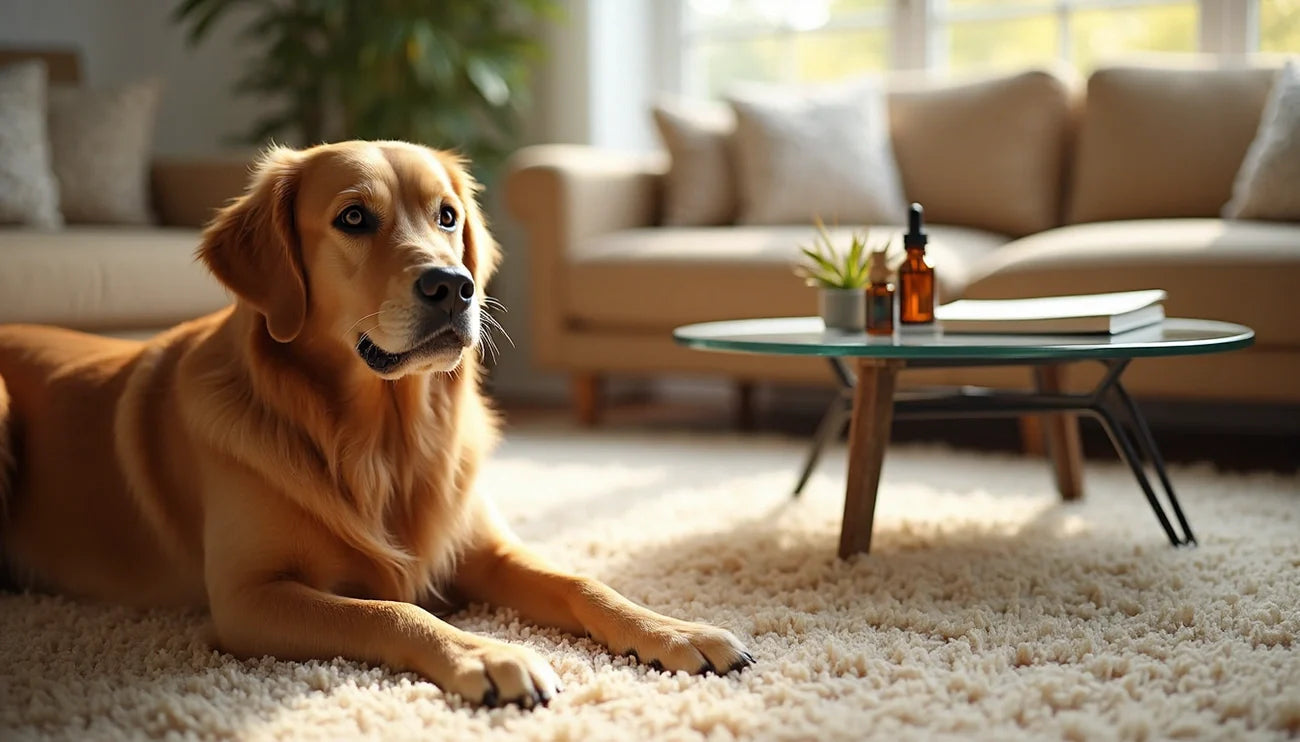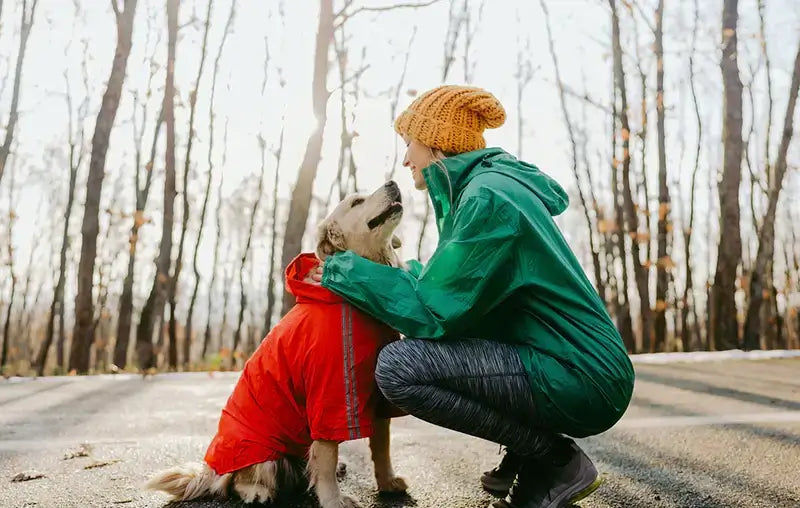
You say goodbye to your furry friend, close the front door, start to wonder how long can you leave a dog alone and then take a few steps toward the driveway when you hear it — a barking dog. The neighbors are not going to be happy, and neither is your barking dog.
Hearing your canine worry when leaving the house can be heartbreaking, and worrisome for you too — especially if your puppy is prone to stress or you live within close proximity to others in an apartment complex or townhome.
Some theorize dogs that compulsively bark simply like to hear their own voices to provide a sense of security and comfort.
Luckily, once you identify the reason for your dog’s homesick howls and separation stress, you can determine how to best stop your dog’s barking when you leave the house.
Why Do Dogs Bark When Left Alone?
No dog is the same — some dogs love to hover around their humans, while others enjoy a few hours of me-time. No matter your pup’s personality, if they’re excessively barking, especially when you leave them alone, there’s often a reason behind their discontent — and barking behavior is the way they communicate that to you, or whoever may be within hearing distance of the loud noise.
While some dogs only bark a few minutes after you leave and quickly settle into solitude, others experience excessive barking, which can last hours. When dealing with excessive barking, it’s important to recognize the probable causes of the barking problem:
- Fear – Some dogs may become alarmed when they’re left alone in a house because their sense of comfort — you — is gone. Your dog may become scared of a loud noise or unusual sounds within and outside the house as well. Oftentimes, dogs that are scared tuck their tails and put their ears back.
- Loneliness – Sometimes dogs just get lonely. You’re their best friend, after all. This is because dogs are pack animals and they’re highly sociable. A lack of social interaction can often lead to feelings of distress, and sometimes abandonment. Your dog may be lonely if they exhibit barking, licking and destructive aggression, such as destroying a couch or tearing up toilet paper. When you’re with your dog, you’ll notice that they love to be by your side and follow you around the house.
- Separation-induced stress – If your dog has had a traumatic experience, such as being abandoned by its previous owner, living in a shelter or losing a family member, they may come with their own slew of emotional responses, which may include excessive barking when you leave home. Why? Some theorize dogs that compulsively bark simply like to hear their own voices to provide a sense of security and comfort. You’ll notice your dog suffers from separation stress if they often whine, pace, drool or pant when you’re preparing to leave home.
- Boredom or restlessness – For particularly energetic pups, spending the day cooped up alone inside a house is rarely ideal. If dogs become bored, they’ll often start boredom barking to call out to their owners or entertain themselves while they’re away.
- Excitement or protectiveness – If your dog hears the neighborhood mailman approach the door while you’re away, he may bark excessively to protect his territory or to simply say hello. If it’s a happy bark, it’ll typically be accompanied by tail wagging and jumping. More territorial barking is often louder and accompanied by aggressive behavior such as growling or snapping.
No matter the reason for your dog’s excessive barking, you want it to stop. We get that. Luckily there are various methods to help your rowdy pup feel safe, calm and collected, even when faced with an empty home.
How to Help Your Pup (and Your Neighbors) Get Some Peace of Mind
When determining how to stop dog barking when left alone, approach the situation like a caring, but stern, parent. In other words, don’t let them take advantage of you with their giant puppy-dog eyes. Having to leave the house is inevitable, so it’s important to make the transition easy for both you and your dog.
Prepare Your Dog For Your Absence
Whether your dog is prone to boredom or stress, take some time during the day before you leave the house to help your dog adjust to a couple of hours alone.
If they’re the overexcited type that gets a little too rambunctious and vocal when left alone, exercise them with a long walk before you leave or opt for a game of fetch in your backyard. Once they’re worn out, your dog will feel content and won’t need to make their boredom or restlessness known.
If your pup is the stressed type that panics at the sight of you grabbing your work bag or keys, you’ll want to desensitize your dog to the idea of being alone before leaving them for long stretches of time.
This strategy can take anywhere from a couple of days to a couple of months depending on the disposition of your fretting Fido. Keep in mind that this type of stress can sometimes be debilitating to your pup, so make sure you adhere to the following steps with lots of kindness and consideration:
- Find your dog’s separation threshold by setting up a camera when you leave the house to observe your pup and identify when they start to get nervous or vocal. The amount of time that passess before the behavior starts is their threshold.
- Gradually desensitize your dog by leaving for designated amounts of time, starting with your dog’s threshold and slowly building up to 30 minutes. To start, you may want to regulate your pup to your absence by only stepping out the door and closing it for a few seconds, especially if your dog suffers from extreme nervousness. Between your absences, participate in “normal” activities such as washing the dishes, sorting through the mail or watching a minute of T.V.
- Give your dog cues that you’ll be leaving the house so that they’re aware that you’re leaving and aren’t taken by surprise. These types of cues can include putting on your shoes, shaking your keys and locking the door. Be aware that your dog may start to panic during these cues. If that’s the case, only introduce one at a time and give them verbal or physical reassurance that you love them and that you’ll be back.
Evaluate Sights and Sounds
If your dog’s excessive barking is stimulated by fear or protectiveness, it may benefit them to pare down excess sights and sounds within the house while you’re away.
Sometimes, unknown clangs and clashes inside and outside the house can scare your fragile pup, causing them to bark or howl. If that’s the case, they may benefit from noise-reduction systems, such as white noise machines, a calming music playlist, or a two-way communication system in which you can speak to your dog to provide them with an extra level of comfort.
If your pup gets easily distracted by those pesky squirrels or the sight of neighborhood dog’s going on their afternoon walks, consider closing the blinds before you leave or adding curtains to your decor to hide any stimulus that may provoke your dog to protect their territory with excessive barking.
Entertain Your Pup
Maybe a new furry friend will provide your pup with the sense of comfort and excitement your dog craves. Or maybe they’d be content with a giant Kong toy filled with peanut butter and treats. Either way, it may be beneficial to distract your dog from their home-alone woes with some form of entertainment. In addition to a furry companion or tasty treat, you can also incorporate:
- Dog-focused T.V. channels
- Chew toys or bones
- Lick pads
- Smart toys
- Hired dog walker or sitter
Try CBD
Dog CBD oil and CBD chews can be a great way to calm your pup while you’re away and cut down any risk of barking or howling that may disrupt your neighbors. Unlike marijuana, CBD contains no detectable THC, so you won’t have to worry about your dog feeling “high” or experiencing any psychoactive effects.
In fact, when considering how to stop a dog howling when left alone, canine CBD oil is a fantastic supplement and may help support your pup’s overall wellness and sense of calmness.
It’s easy to administer, too — with CBD oil, you can put a few drops in their breakfast or peanut butter snack before you set out.
Quiet Your Pup’s Mind With Zebra CBD
Leaving the house to the sounds of your dog’s barks, howls and whines can put a real wrench in your Sunday brunch plans — and create a significant amount of stress for your pup. To stop a dog from barking when left alone, first identify the reason for their discomfort and then find a solution that works best for you and your pup.
Make one of those solutions Zebra CBD.
Here, we offer a variety of dog-friendly CBD solutions, from CBD Oil for Dogs to beef-flavored Stress & Calming Chews to promote your dog’s overall sense of calmness and relaxation. Our products are designed specifically with your dog in mind — each is formulated with organic hemp with maximum bioavailability for fast-acting effects. Our products are also free of heavy metals, harmful microbes and artificial flavors so you can leave home knowing your pup is only experiencing the best.
Put a rest to separation stress with careful planning and Zebra CBD.
Source:
Fetch by WebMD. Why Dogs Bark and Curbing Excessive Barking. https://pets.webmd.com/dogs/guide/understanding-why-dogs-bark#5










